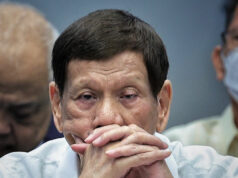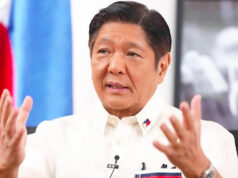Human Rights Watch urges dropping of VP raps
PHILIPPINE authorities should drop a “preposterous complaint” of inciting to sedition and other offenses against opposition politicians including Vice-President Maria Leonor G. Robredo, religious leaders and human rights advocates, Human Rights Watch said on Wednesday.
“The preposterous complaint against the vice-president and the others is a transparent attempt to harass and silence critics of President Duterte’s bloody drug war,” Brad Adams, Asia director at Human Rights Watch, said in an emailed statement. “Threatening criminal charges against the vice-president, outspoken bishops and rights lawyers suggests that Duterte’s egregious human rights record is catching up with him.” Police have filed a complaint against Ms. Robredo and the others for allegedly plotting President Rodrigo R. Duterte’s ouster by linking him and his family to the illegal drug trade through a series of videos.
The Office of the Solicitor General, which allegedly helped draft the police complaint at the Ombudsman, in a statement said it is its duty to serve clients seeking legal advice.
Police last week filed a complaint of inciting to sedition, cyberlibel, libel, estafa, harboring a criminal and obstruction of justice against Ms. Robredo, several senators, church leaders and lawyers, as well as Peter Joemel Advincula, the self-confessed drug dealer who was featured in the videos.
Mr. Advincula had sought legal assistance in filing charges against members of the drug syndicate he formerly belonged to. Later that month, he surrendered to police over estafa charges, and tagged the Liberal Party as behind the propaganda.
The Liberal Party has accused the government of political harassment and persecution, saying the complaint is based on lies.
Human Rights Watch said governments and donors should press the Duterte administration to end its persecution of critics of its “murderous war on drugs.” A conviction for incitement to sedition carries a maximum penalty of six years in jail.
The Duterte administration has previously targeted political opposition figures and critics of the drug war, Human Rights Watch said. In February 2017, it accused Senator Leila de Lima, staunch critic of the government’s anti-illegal drug campaign, of involvement in the drug trade. It has also filed sedition charges against a former senator and Duterte critic, Antonio Trillanes IV.
Criticism of the administration centers on the drug war killings that began soon after Mr. Duterte became president in June 2016, the human rights group said. “Since then, police and police-backed gunmen have summarily executed thousands of alleged drug dealers and users in mainly poor urban communities across the Philippines.”
Police have said they have killed more than 6,600 people who “fought back” in the anti-drug campaign, while estimates by domestic rights groups put the number executed at more than 27,000.
The United Nations Human Rights Council passed a resolution on July 11, calling on the UN human rights office to present a comprehensive report on human rights in the Philippines by June next year.
“The sedition complaint looks like little more than a kneejerk reaction to the UN Human Rights Council’s resolution on the Philippines,” Mr Adams said. “Friends of the Philippines should not stay silent when the administration retaliates against those promoting respect for human rights in the country.”
Presidential spokesman Salvador S. Panelo defended the solicitor general. “There’s nothing wrong with that because it’s the duty of the SolGen In a lawyer-client relationship,” he said at a briefing in Manila yesterday.
Justice Secretary Menardo I. Guevarra said the issue of who drafted the complaint-affidavit is not the focus of his department. “What is of utmost importance is whether or not the complainant’s evidence will support its allegations and establish probable cause against all the respondents,” he said in a text message. — Vann Marlo M. Villegas



